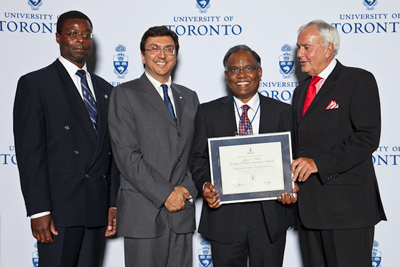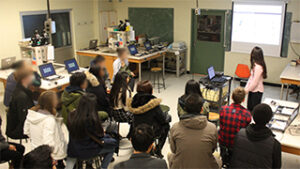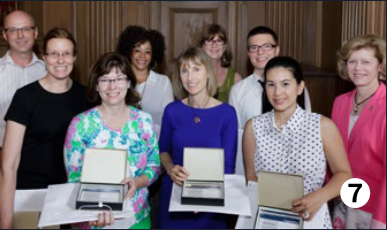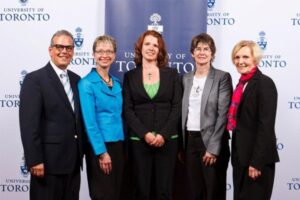Dr. Christopher Perumalla, Award of Excellence 2010 recipient, Joan E. Foley Quality of Student Experience Award
 Dr. Perumalla is a natural, gifted and visionary leader, with an impeccable record as an educator. His work outside the classroom as a mentor and sometimes just as a good listener is just as impressive. Just ask any of his students over the past 25 years.
Dr. Perumalla is a natural, gifted and visionary leader, with an impeccable record as an educator. His work outside the classroom as a mentor and sometimes just as a good listener is just as impressive. Just ask any of his students over the past 25 years.
Award of recipient
In addition to lecturing in several physiology courses, Dr. Perumalla spends many hours talking to hundreds of students outside the classroom as an undergraduate academic counselor in the Physiology Specialist and Major programs. “You have been a mentor and a willing guide for me throughout my undergraduate career at U of T, and have truly made a difference in my life” one student says. “Thank you for your ear and advice.
Dr. Perumalla created the Youth Summer Program for the Faculty of Medicine in his role as Director of the Division of Teaching Laboratories (DTL). The program provides high school students with an exclusive glimpse into the world of medicine, medical research and other health science professional programs. Last year, Dr. Perumalla visited Stanford University which has had a similar program for 25 years, and his counterpart there was so impressed with what Dr. Perumalla had accomplished in just two years, she visited U of T to learn more about what he has done here.
Last year, Dr. Perumalla offered four full scholarships to economically disadvantaged high school students, making it possible for them to attend the Youth Summer Program. He is also working with the Toronto District School Board and the Peel-Dufferin Catholic School Board to offer scholarships for inner city high school students to attend the program cost-free; both these school boards have matched the scholarships offered by the Faculty of Medicine.
In his role as director of the DTL, Dr. Perumalla is working with faculty members to incorporate new technologies and lab exercises. Graduate students get an opportunity to work with faculty to design and test the labs.
Dr. Perumalla has been instrumental in designing, developing and delivering Faculty of Medicine’s first online course in Basic Human Physiology. This online course is a full course equivalent course and is offered to non-U of T students in collaboration with School of Continuing Studies.
Dr. Perumalla won the Faculty of Medicines most prestigious, W.T. Aikins Award in 2006 in the category of large classroom lecture delivery and has won the Life Sciences Undergraduate Excellence Award. He has been awarded the Physiology Departmental Excellence of Teaching Award three times in the past ten years.
Joan E. Foley Quality of Student Experience Award
AWARD DESCRIPTION
The University of Toronto Alumni Association (UTAA) is pleased to accept applications for the Joan E. Foley Quality of Student Experience Award. This $1,000 prize is presented annually to a student, alumnus/a, faculty or administrative staff member who has made a distinctive and lasting contribution to enhancing the quality of the undergraduate or graduate student experience at the University of Toronto. Candidates will be assessed in light of the University’s Stepping-Up goals: offering students a personally and intellectually rewarding co-curricular and extracurricular learning experience “beyond the classroom;” involving students in the life of the city; and seeking to ensure that students feel like valued members of the University community — a perception that will in turn foster a sense of loyalty once they become alumni
Award recipients will be honoured at the Awards of Excellence ceremony held annually in the Spring.
HISTORY OF THE SCHOLARSHIP
The award is a tribute to Joan Foley’s legacy and dedication to improving the student experience on campus throughout her career at the University of Toronto, which spans over forty years. As a professor of psychology, Foley made teaching a priority, presenting her students with a richly complex and supportive experience in the classroom. Foley was also a distinguished leader in university administration, named the first female Provost at the University of Toronto and the first female Principal at the University of Toronto Scarborough, among other notable positions. Foley worked closely with students in order to promote an enriching overall educational experience, in and out of the classroom. Among many other accomplishments, Foley played a significant role in the development of co-operative programs and continues to be a key adviser on a variety of academic and community programs at the Scarborough campus.
SELECTION CRITERIA
In making its decision, the Selection Committee will take into account the nominee’s contribution in both the academic or extracurricular domain of student life. The nature, extent, degree and impact of the nominee’s contribution to the quality of the student experience will also be assessed.
For more about the ‘Awards of Excellence’.

 Congratulations to our first-ever Spotlight Award winner – James Wilson! Thank you for always going the extra mile with a smile! Congratulations to our first-ever Spotlight Award winner – James Wilson! Thank you for always going the extra mile with a smile
Congratulations to our first-ever Spotlight Award winner – James Wilson! Thank you for always going the extra mile with a smile! Congratulations to our first-ever Spotlight Award winner – James Wilson! Thank you for always going the extra mile with a smile Perspectives Conference – Reaction Time Workshop
Perspectives Conference – Reaction Time Workshop

 Dr. Perumalla is a natural, gifted and visionary leader, with an impeccable record as an educator. His work outside the classroom as a mentor and sometimes just as a good listener is just as impressive. Just ask any of his students over the past 25 years.
Dr. Perumalla is a natural, gifted and visionary leader, with an impeccable record as an educator. His work outside the classroom as a mentor and sometimes just as a good listener is just as impressive. Just ask any of his students over the past 25 years.